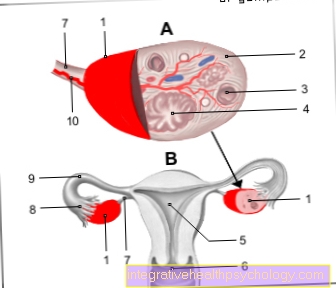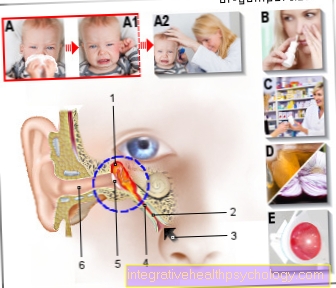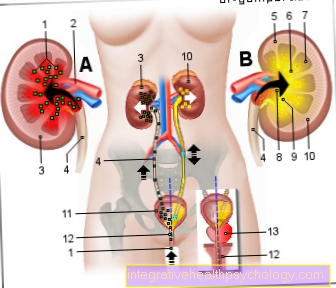Test for hepatitis B
definition
Hepatitis B is an inflammation of the liver caused by the hepatitis B virus and can cause chronic damage to the liver. There is no such thing as a “test” for hepatitis B; there are many ways to determine whether you are infected with hepatitis B. For example, when testing for hepatitis B, it is checked whether specific antibodies against the hepatitis B virus and / or virus components are present in the patient's blood. Depending on which antibodies and how many or which components of the virus are found in the blood, laboratory physicians and doctors can tell whether the infection is fresh or recent, or whether the patient acquired the antibodies through a vaccination.

What are the different tests?
There are several tests that can be used to determine whether a patient is infected with the hepatitis B virus:
- Antibody tests: to be used in the diagnosis of hepatitis B. Anti-HBc IgM- and Anti-HBc IgG antibodies tested. These antibodies are directed against a protein from the virus core. IgM antibodies are formed at the beginning of the infection, and their levels decrease as the infection progresses. IgG antibodies are formed a little later than IgM antibodies and remain detectable in the blood even after the hepatitis B infection has healed. They then indicate that a patient has gone through hepatitis B. Other antibodies in hepatitis B diagnostics are Anti-HBe (against a protein that is produced during virus replication) and Anti-HBs antibodies (against a surface protein). These antibodies do not rise until several months after infection with hepatitis B and generally indicate (beginning) healing.
- Virus DNA test: The genetic material of the hepatitis B virus consists of DNA. In the event of an infection, this DNA can be detected in the blood, about 2-4 weeks before other virus components and antibodies can be detected in the blood.
- Virus component test: Can be detected in the blood HBs-Ag (Hepatitis B surface antigen), a component of the surface of the hepatitis B virus. This virus component can usually be detected before symptoms begin. After the hepatitis B has healed, the HBs-Ag is no longer detectable. If it can still be found in the blood after 6 months, it is called a chronic hepatitis B infection. It can still be proven HBe-Ag (Hepatitis B envelope antigen), a protein that is produced when viruses replicate.
How quickly is the result there?
It takes about 1-2 days to get a result after the blood sample for the hepatitis B test. If the test is e.g. performed during a hospital stay, it can be a little faster. With a resident doctor, it can sometimes take a little longer, depending on the laboratory with which this doctor works. The genetic makeup of the virus, the DNA, can be detected quite early after infection, the first virus components are detectable in the blood at the earliest 2-4 weeks after infection.
What does such a test cost?
The prices for the test for hepatitis B vary depending on the laboratory, but should be between 50-80 euros. In internet pharmacies you can e.g. Purchase quick tests from 40 euros. If the health insurance company does not pay, the doctor with whom you want to have the test carried out can provide more information about the costs of the laboratory with which he is working. Some health authorities also offer free HIV, hepatitis C, and hepatitis B tests.
Does the health insurance company bear the costs?
If there is justified suspicion of infection with hepatitis B, the costs for the test are usually covered by the statutory health insurance. The suspicion is based, for example, on the fact that the patient suffers from typical symptoms or belongs to a risk group (e.g. intravenous drug use, sex workers). If there is a possible trigger (e.g. unprotected sexual intercourse with an infected person), a test is also justified and financed. In addition, individual health insurers also assume the costs regardless of the risk factors mentioned above. In individual cases, this can be requested from the health insurance company.
Who should get such a test?
On the one hand, a test for hepatitis B should be carried out if a patient has symptoms that are compatible with possible hepatitis B infection. Second, risk groups should be tested to detect a silent infection with no symptoms before the liver is permanently damaged. Here is a list of the most important groups of people for whom a test for hepatitis B makes sense:
-
Patients with liver disease: increased liver values, other symptoms of inflammation of the liver, liver fibrosis, liver cirrhosis, liver cancer
-
People with a migration background from countries in which hepatitis B occurs more frequently: South America, Africa, China, the Middle East, Eastern and Southern Europe
-
Sex partners of patients diagnosed with hepatitis B.
-
Patients before and after organ transplantation, before and after chemotherapy, before and after other immunosuppressive therapy
-
Other risk groups: homosexual men, sex workers, intravenous drug addicts, dialysis patients, patients with HIV and / or hepatitis C infection
-
Pregnant women, children of HBsAg-positive mothers
-
Medical staff after any contact with infectious blood (e.g. after a needle stick injury)
How certain is the result of such a test?
The test procedures used today are very safe and have a high sensitivity (describes ability to identify sick people as sick) and Specificity (describes the ability to identify healthy people as healthy). The test results are therefore reliable in almost all cases. However, the variable incubation time for hepatitis B poses a problem for test reliability. Only after about three months can one actually assume that no infection has occurred if the test is negative.
When can you do such a test after exposure?
In principle, the test can be carried out immediately after exposure, but then only shows the status quo before the infection event in question. It makes sense to perform the test a few weeks after exposure. The virus DNA can already be detected one week after contact, the various virus components only 2-4 weeks later. It is generally believed that if an infection has occurred, a test for hepatitis B would be positive in about three months.
Can you do a test like this during pregnancy?
Not only can a hepatitis B test be taken during pregnancy, it is even done routinely on pregnant women. However, not all of the above-mentioned virus components and antibodies are tested, only HBsAg, the surface protein of the hepatitis B virus. It is increased in the case of an active infection and is tested in the last trimester of pregnancy (from the 32nd week) to protect the unborn child from infection. The risk of infection from mother to child is highest during childbirth.If an elevated value for HBsAg is found during this test, further tests are carried out to assess the activity of the infection.
You might also be interested in this topic: Pregnancy checkups





























